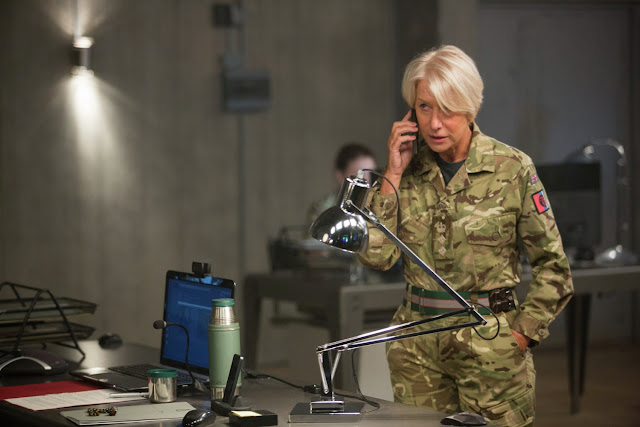A modern take on the 12 Angry Men concept but as a thriller, Eye In The Sky is a riveting exploration of group-think and morality in an era of depersonalized warfare where bureaucratic procedure and legal safeguards reveal there's still always someone that has to pull the trigger. Helen Mirren plays an English Colonel presented with an opportunity to take out several high profile most-wanted terrorists in East Africa. Her team consists of a joint task-force represented globally and coordinated through multiple forms of conference communication. Soldiers, technicians, and politicians are all connected via satellite from locations in England (Surrey & London), the US (Las Vegas, Hawaii, DC), Kenya, Singapore, China, etc. What starts out as a more simple mission of capturing a few terrorists based on solid intel becomes a more complicated decision of deploying a destructive payload from an unmanned aircraft towards multiple targets. The complication comes from one little girl selling bread in the street. Do they risk killing her or allow the potential killing of dozens from suicide bombers?
Overall I found Eye In The Sky to be a well-constructed demonstration of the choices facing those in power. Despite the shortcuts and possible fudging of numbers or of laws, I was impressed at the level of deliberation and thoughtfulness that went into a difficult decision like this. The situation is fraught with potential political, moral, and ultimately human consequences. The film does a great job of remaining an observer of the many viewpoints expressed for or against pulling the trigger and the subsequent collateral damage - one of many terms used as placeholder for the more terrible-sounding truth: possibly killing an innocent girl. There are no good choices.
The choices that must be made here by politicians and cabinet appointees are uniquely modern due to the progress of technology. The decision that would have been made by a soldier or officer in the field decades before is now being presented to, essentially, a committee. The existence of an omniscient eye guided by pilots half a world away allows real-time observation and analysis. The Kenyan intelligence team on the ground is just another resource available to Mirren's character and her team, always calculating percentages and probabilities that really represent actual human lives.
I was even more surprised to realize when the movie ended that Gavin Hood was the director (he also has a small part). After doing an A-for-effort job in directing the ultimately disappointing adaptation of Ender's Game I wouldn't have given him the credit of assuming he could deliver a film with such balance within ambiguity in Eye In The Sky, but I'm not as familiar with the rest of filmography.
The cast was convincing in presenting the many different points of view, most of them valid from one perspective or another. While Helen Mirren, Aaron Paul, and Barkhad Abdi (Captain Phillips) all do an excellent job, I noticed Alan Rickman most especially considering this was his final film role. They all have their part in this international coalition. Some characters see the choice before them as simple. Are they brave or foolhardy? Others see it as more difficult to make and are unsure. Are they morally cautious or cowardly? The film provides an excellent exploration of these questions and the result could be interpreted easily as making the case for any of the different viewpoints - and that is reflection of great skill in writing and directing.



